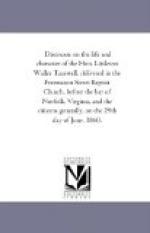“In 1787 your father commenced the practice of the law in Williamsburg, and mine shortly after removed from thence to Kingsmill, leaving me in Williamsburg under the care of your father to complete my education. Under his kind and useful advice, my rapid advance in my studies, both at school and in college, and my increased age, began to qualify me as a companion for him. By confiding to my discretion matters not often entrusted to those so young as I was, he taught me prudence; and, by his excellent precepts and example, he contributed much to the improvement of both my mind and manners.”
As a boy of quick parts, Littleton doubtless observed with more or less attention the events that were passing around him. One proof of his recollection at an early age may be found in that shadowy notion which he carried to his grave, of the personal appearance of the venerable old treasurer, Robert Carter Nicholas, whom, as he died in 1780, he could only have seen when he was six years old. His father, as before observed, was constantly engaged in public life; and it is certain that young Tazewell had frequent opportunities of seeing the statesmen of that era. I well remember hearing him describe a visit he made to Patrick Henry, when the orator lived at Venable’s Ford in Prince Edward, and his finding him in the shade of an oak playing the fiddle for the amusement of a group of girls and boys.
His first regular teacher was Walker Murray, with whom he prosecuted the study of Latin. At this school he began his intimacy with John Randolph. They were in the same class, and studied Cordery together; and here they formed a friendship which lasted without abatement until it was ended by the death of that eloquent but eccentric man. At parting—for Randolph went over to Bermuda—the young friends, who had no other property under their control, exchanged Corderys with each other; and nearly half a century afterwards, when one of them had become a Senator of the United States, and the other Minister Plenipotentiary to Russia. Randolph stated at a public dinner in Norfolk, that he still possessed the Cordery of Tazewell. I have heard Mr. Tazewell say that Randolph was very idle at school, that he was flogged regularly every Monday morning and two or three times during the week, and that he was the most beautiful boy at this period he ever beheld.
Young Tazewell at an early age entered the college of William and Mary, then under the presidency of Bishop Madison, and was, as may be presumed from his own statement, and as we learn from other sources, a diligent and accurate scholar. He was probably stimulated to exertion by the presence of several young men who were members of the institution at various times during his college course. Among these were James Barbour, of Orange, afterwards the colleague of Tazewell in the House of Delegates and in the Senate of the United States, Governor of Virginia, Secretary of War, and Minister to England, and renowned for his




